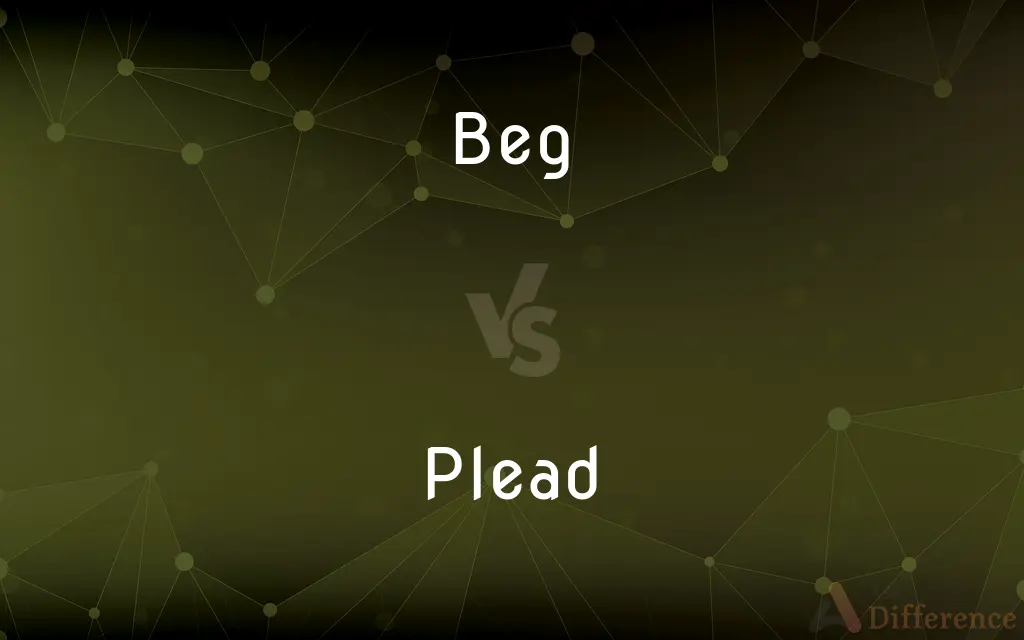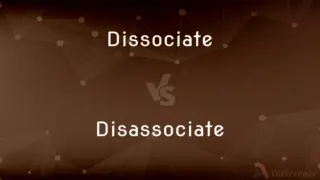Beg vs. Plead — What's the Difference?
By Tayyaba Rehman — Updated on November 7, 2023
"Beg" means to ask for something earnestly or humbly, while "plead" often refers to making an urgent, emotional appeal, especially in a legal context.

Difference Between Beg and Plead
Table of Contents
ADVERTISEMENT
Key Differences
"Beg" often conveys a sense of humility and desperation, as in asking for charity, whereas "plead" conveys a sense of urgency and a request for mercy or leniency, particularly in legal or serious personal situations. Begging implies a power imbalance, where the person begging is in a lower position in relation to the one they're asking for help. Pleading, however, can also imply a negotiation or an appeal to someone's better nature or the law for a favorable decision.
The term "beg" can carry a negative connotation, suggesting subservience or a lack of dignity. In contrast, "plead" is more formal and is used in contexts where one seeks justice, understanding, or a particular outcome that they feel is deserved or necessary.
"Beg" is straightforward, reflecting an immediate need or desire, often for basic necessities. On the other hand, "plead" is complex, involving emotional or logical arguments to persuade the other party to grant a request or a favor.
Comparison Chart
Connotation
Desperation, sometimes shame
Urgency, legal appeal
Context
Informal, personal pleas
Formal, often legal settings
ADVERTISEMENT
Power Dynamics
Imbalance, subservience
Negotiation, appeal
Emotional Intensity
Can be lower
Typically higher
Usage in Sentences
Direct request for aid
Formal request or argument
Compare with Definitions
Beg
To implore desperately.
She begged him to stay.
Plead
To assert a defense in legal proceedings.
The defendant pleaded not guilty.
Beg
To require as necessary or appropriate.
The situation begs for a quick solution.
Plead
To use arguments or requests to persuade.
He pleaded with the judge for leniency.
Beg
To ask earnestly or piteously for a favor.
They begged for mercy.
Plead
To provide an explanation or argument.
He pleaded his reasons for arriving late.
Beg
To ask (someone) for something in an urgent or humble manner
Begged me for help.
Begged me to give him the phone number.
Plead
To state a case in a court of law.
The lawyer pleaded the case skillfully.
Beg
To ask for (something) in an urgent or humble manner
Beg someone's forgiveness.
Beg a favor.
Plead
To appeal earnestly; beg
Plead for more time.
Beg
To ask for (food or money, for instance) as a beggar.
Plead
To offer reasons for or against something; argue earnestly
Plead against a bill.
Beg
To ask (permission) to do something
Begged leave to attend the ceremony.
Plead
To provide an argument or appeal
Your youth pleads for you in this instance.
Beg
To evade; dodge
A speech that begged the real issues.
Plead
(Law) To respond to a criminal charge
Plead guilty.
Beg
To take for granted without proof
Beg the point in a dispute.
Plead
To assert as defense, vindication, or excuse; claim as a plea
Plead illness as the reason for his absence.
Beg
To ask for something, especially money or food from strangers, in an urgent or humble manner.
Plead
To specify (a cause of action or defense)
Plead a First Amendment claim.
Beg
To live as a beggar.
Plead
To set forth in a pleading
Plead that plaintiff suffered damages as a result of the breach of contract.
Beg
To make an urgent or humble plea
Beg for mercy.
Plead
To present (an argument or a plea), especially in a legal case.
The defendant has decided to plead not guilty.
Beg
(intransitive) To request the help of someone, often in the form of money.
He begged on the street corner from passers-by.
Plead
(intransitive) To beg, beseech, or implore, especially emotionally.
He pleaded with me not to leave the house.
He was pleading for mercy.
Beg
(transitive) To plead with someone for help, a favor, etc.; to entreat.
I beg your pardon. I didn’t mean to cause offence.
He begged her to go to the prom with him.
Plead
(transitive) To offer by way of excuse.
Not wishing to attend the banquet, I pleaded illness.
It is no defence to plead that you were only obeying orders.
Beg
(transitive) To unwillingly provoke a negative, often violent, reaction.
Plead
(transitive) To discuss by arguments.
Beg
(transitive) In the phrase beg the question: to assume.
Plead
To argue in support of a claim, or in defense against the claim of another; to urge reasons for or against a thing; to attempt to persuade one by argument or supplication; to speak by way of persuasion; as, to plead for the life of a criminal; to plead with a judge or with a father.
O that one might plead for a man with God, as a man pleadeth for his neighbor!
Beg
In the phrase beg the question: to raise (a question).
Set aside
Plead
To present an answer, by allegation of fact, to the declaration of a plaintiff; to deny the plaintiff's declaration and demand, or to allege facts which show that ought not to recover in the suit; in a less strict sense, to make an allegation of fact in a cause; to carry on the allegations of the respective parties in a cause; to carry on a suit or plea.
Beg
To ask to be appointed guardian for, or to ask to have a guardian appointed for.
Plead
To contend; to struggle.
Beg
The act of begging; an imploring request.
Plead
To discuss, defend, and attempt to maintain by arguments or reasons presented to a tribunal or person having uthority to determine; to argue at the bar; as, to plead a cause before a court or jury.
Every man should plead his own matter.
Beg
A provincial governor under the Ottoman Empire; a bey.
Plead
To allege or cite in a legal plea or defense, or for repelling a demand in law; to answer to an indictment; as, to plead usury; to plead statute of limitations; to plead not guilty.
Beg
A title of honor in Turkey and in some other parts of the East; a bey.
Plead
To allege or adduce in proof, support, or vendication; to offer in excuse; as, the law of nations may be pleaded in favor of the rights of ambassadors.
I will neither plead my age nor sickness, in excuse of faults.
Beg
To ask earnestly for; to entreat or supplicate for; to beseech.
I do beg your good will in this case.
[Joseph] begged the body of Jesus.
Plead
Appeal or request earnestly;
I pleaded with him to stop
Beg
To ask for as a charity, esp. to ask for habitually or from house to house.
Yet have I not seen the righteous forsaken, nor his seed begging bread.
Plead
Offer as an excuse or plea;
She was pleading insanity
Beg
To make petition to; to entreat; as, to beg a person to grant a favor.
Plead
Enter a plea, as in courts of law;
She pleaded not guilty
Beg
To take for granted; to assume without proof.
Plead
Make an allegation in an action or other legal proceeding, especially answer the previous pleading of the other party by denying facts therein stated or by alleging new facts
Beg
To ask to be appointed guardiln for, or to aso to havo a guardian appointed for.
Else some will beg thee, in the court of wards.
Plead
To make an emotional appeal.
She pleaded for help in finding her lost child.
Beg
To ask alms or charity, especially to ask habitually by the wayside or from house to house; to live by asking alms.
I can not dig; to beg I am ashamed.
Beg
Call upon in supplication; entreat;
I beg you to stop!
Beg
Make a solicitation or entreaty for something; request urgently or persistently;
Henry IV solicited the Pope for a divorce
My neighbor keeps soliciting money for different charities
Beg
Ask to obtain free;
Beg money and food
Beg
To ask for something earnestly or humbly.
The man begged for food on the street.
Beg
To evade or dodge a question.
He begged the question during the interview.
Common Curiosities
Are "beg" and "plead" interchangeable?
They can be in some contexts, but "plead" is more formal and specific.
Is "begging" considered impolite?
It can be, depending on context; begging is sometimes seen as undignified.
Is "pleading" always emotional?
Often, yes, as it usually conveys an urgent, emotional appeal.
Can "plead" be used outside of court?
Yes, "plead" can also refer to earnest requests in personal situations.
Is "plead" always used with "guilty" or "not guilty"?
In legal contexts, yes, but it can be used more broadly outside court.
Does "beg" always imply poverty?
Not always; it can simply mean to ask earnestly for anything.
Can someone "beg" in a legal context?
It's less common, as "plead" is the usual term used in legal situations.
Does "pleading" suggest weakness?
Not necessarily; it can also imply a strong appeal for justice.
What is "begging the question"?
It's a logical fallacy where a statement is assumed to be true without evidence.
Can "plead" imply a legal defense?
Yes, "plead" is often used to describe the legal defense put forth in court.
Can animals "beg" or "plead"?
Animals can "beg" for treats or attention, but "plead" is not usually used for animals.
Can "begging" be seen as manipulative?
In some situations, yes, especially if the person begging is not sincere.
Does "beg" have different meanings?
Yes, besides asking earnestly, it can mean to evade a question or require something.
Is "pleading" a sign of guilt?
Not necessarily; it's a formal assertion in legal terms, not an admission of guilt.
Is it offensive to tell someone they are "begging"?
It can be, depending on the tone and context of the conversation.
Share Your Discovery

Previous Comparison
Pathophysiology vs. Physiology
Next Comparison
Dissociate vs. DisassociateAuthor Spotlight
Written by
Tayyaba RehmanTayyaba Rehman is a distinguished writer, currently serving as a primary contributor to askdifference.com. As a researcher in semantics and etymology, Tayyaba's passion for the complexity of languages and their distinctions has found a perfect home on the platform. Tayyaba delves into the intricacies of language, distinguishing between commonly confused words and phrases, thereby providing clarity for readers worldwide.














































